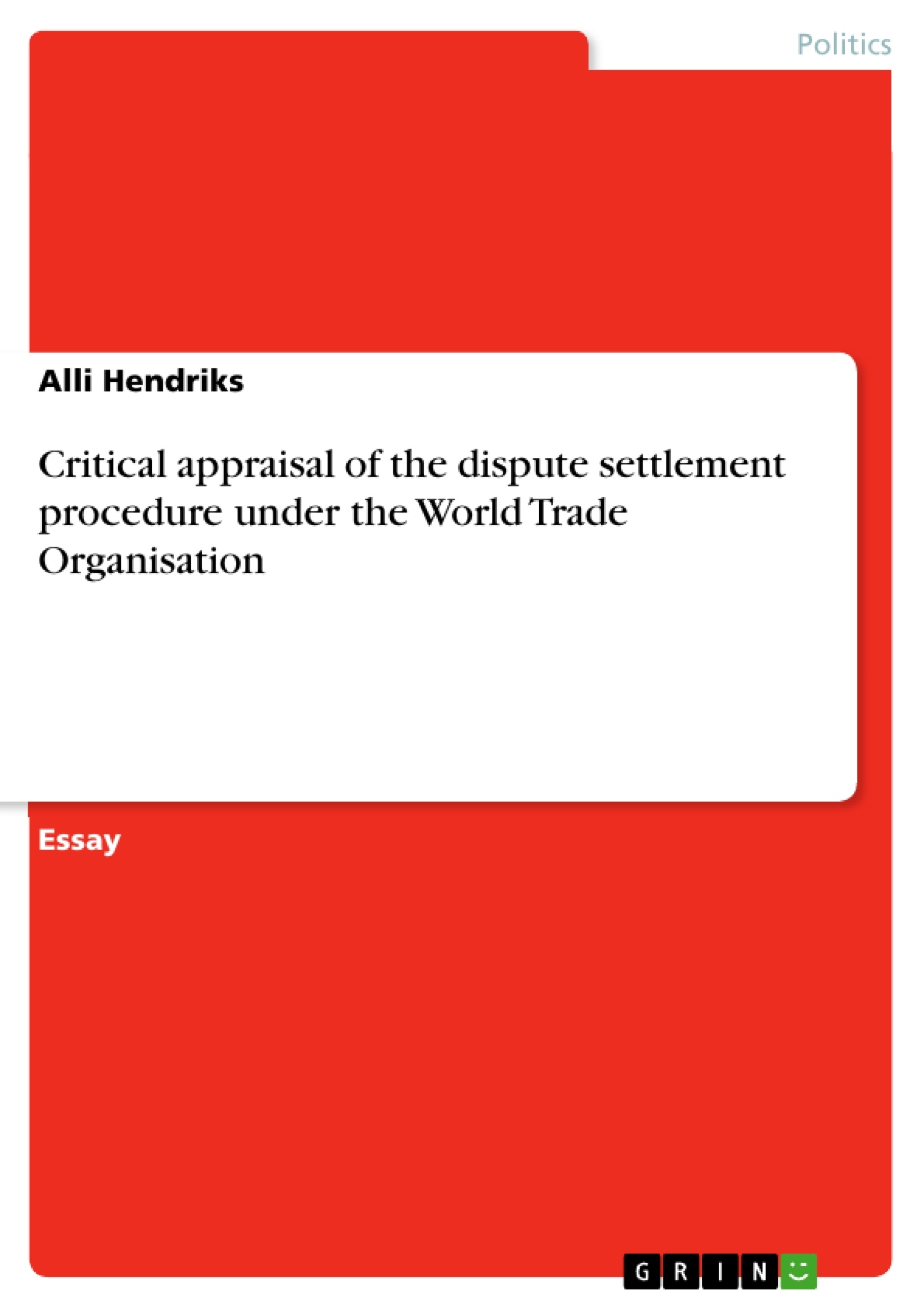The Dispute Settlement Procedure (DSP) embodied in the Dispute Settlement Understanding (DSU) of the World Trade Organisation (WTO) is a highly effective mechanism to ensure disputes are resolved in a reasonable period of time. However, it does not satisfactorily address the needs of developing countries to access the DSP. This could be reformed through financial and legal assistance for these countries. In addition, a more substantiated non-compliance clause could assist the timely resolution of disputes so as to not disrupt the free flow of international trade in goods and services, a key objective of the WTO system.
Inhaltsverzeichnis (Table of Contents)
- Introduction
- Dispute Settlement Procedure of the World Trade Organisation
- Purpose of the DSP of the WTO
- Effectiveness of the DSP
- Developing Countries at the Panel and Appellate Body Stage
- Reform?
- Compliance and Retaliation
- Reform?
- Conclusion
Zielsetzung und Themenschwerpunkte (Objectives and Key Themes)
This text examines the effectiveness of the World Trade Organisation's Dispute Settlement Procedure (DSP) in resolving trade disputes. It explores the challenges faced by developing countries in accessing and participating in the DSP and advocates for reforms to address these issues. The text also analyzes the effectiveness of the DSP in achieving its stated objectives, including promoting security and predictability in the multilateral trading system.
- Effectiveness of the WTO's Dispute Settlement Procedure
- Access and participation of developing countries in the DSP
- Compliance with WTO rulings and the role of retaliation
- The need for reform in the DSP
- The role of the DSP in promoting security and predictability in the multilateral trading system
Zusammenfassung der Kapitel (Chapter Summaries)
The first chapter introduces the Dispute Settlement Procedure (DSP) of the World Trade Organisation (WTO) and its origins in the General Agreement on Tariffs and Trade (GATT). It outlines the key changes made to the dispute settlement system from the GATT to the WTO, including the introduction of negative consensus and a rigid rule-based system for resolving disputes. The chapter concludes by discussing the purpose of the DSP, which is to promote security and predictability in the multilateral trading system.
The second chapter examines the effectiveness of the WTO's Dispute Settlement Procedure (DSP) in achieving its objectives. It discusses various measures of effectiveness, including the volume of cases initiated, the implementation of rulings, and the fairness and accessibility of the system. The chapter highlights the concerns raised by some commentators regarding the limited participation of developing countries in the DSP.
The third chapter focuses on the role of developing countries in the WTO's Dispute Settlement Procedure (DSP). It analyzes the challenges faced by these countries in accessing and participating in the system, including financial and legal constraints. The chapter argues that the participation of developing countries is crucial for the credibility and acceptability of the DSP and explores potential reforms to enhance their access and representation.
The fourth chapter examines the issue of compliance and retaliation in the WTO's Dispute Settlement Procedure (DSP). It discusses the importance of effective compliance mechanisms in ensuring the timely resolution of disputes and the potential for retaliation as a measure to enforce compliance. The chapter analyzes the effectiveness of the existing compliance system and explores potential reforms to strengthen its effectiveness.
Schlüsselwörter (Keywords)
The key terms and concepts explored in this text include the Dispute Settlement Procedure (DSP), the World Trade Organisation (WTO), developing countries, compliance, retaliation, security, predictability, multilateral trading system, and access to justice. The text also delves into the challenges faced by developing countries in accessing and participating in the DSP and the need for reform to address these issues.
- Quote paper
- Alli Hendriks (Author), 2016, Critical appraisal of the dispute settlement procedure under the World Trade Organisation, Munich, GRIN Verlag, https://www.grin.com/document/349904



